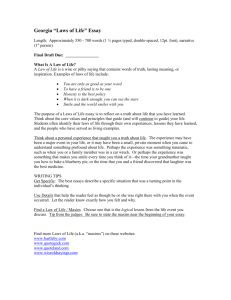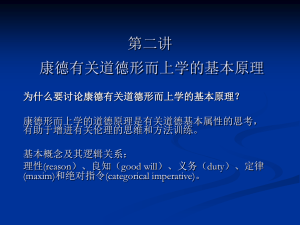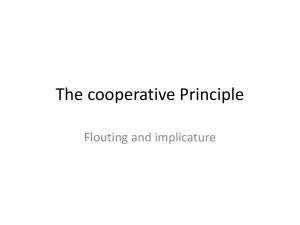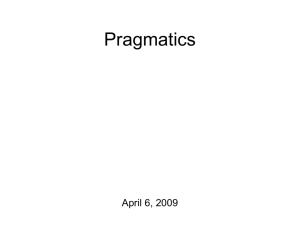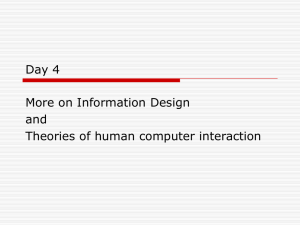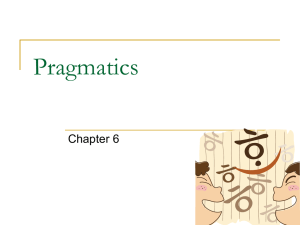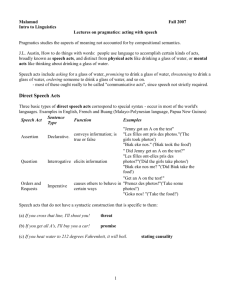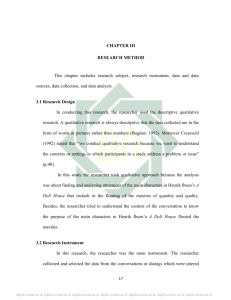chapter four conclusion
advertisement
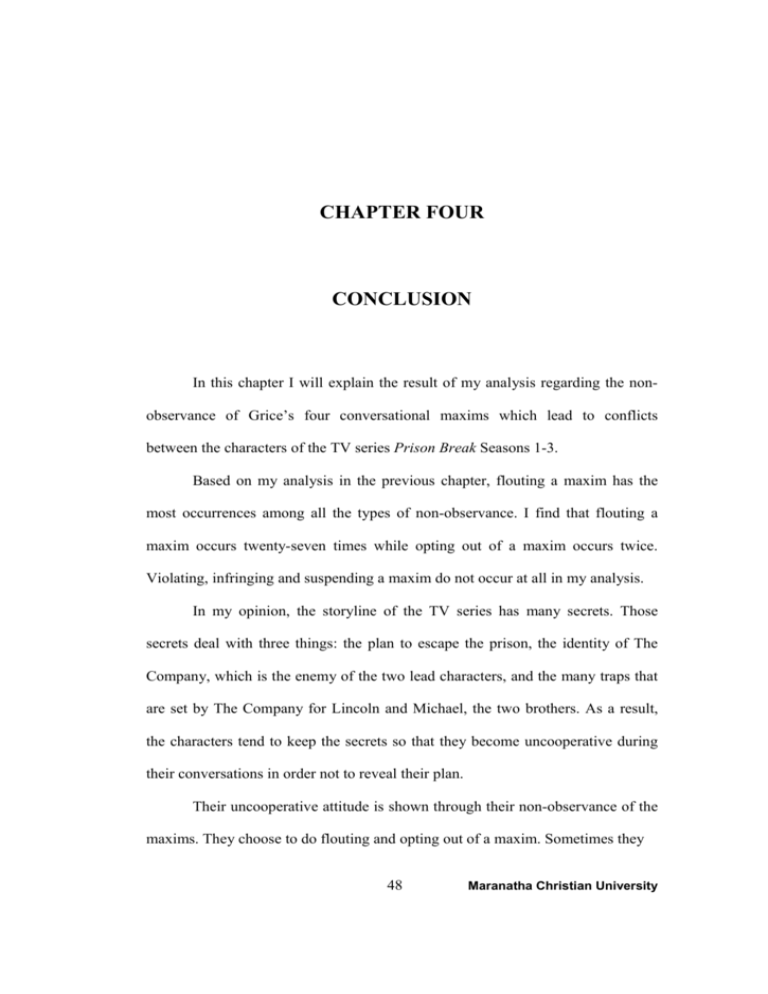
CHAPTER FOUR CONCLUSION In this chapter I will explain the result of my analysis regarding the nonobservance of Grice’s four conversational maxims which lead to conflicts between the characters of the TV series Prison Break Seasons 1-3. Based on my analysis in the previous chapter, flouting a maxim has the most occurrences among all the types of non-observance. I find that flouting a maxim occurs twenty-seven times while opting out of a maxim occurs twice. Violating, infringing and suspending a maxim do not occur at all in my analysis. In my opinion, the storyline of the TV series has many secrets. Those secrets deal with three things: the plan to escape the prison, the identity of The Company, which is the enemy of the two lead characters, and the many traps that are set by The Company for Lincoln and Michael, the two brothers. As a result, the characters tend to keep the secrets so that they become uncooperative during their conversations in order not to reveal their plan. Their uncooperative attitude is shown through their non-observance of the maxims. They choose to do flouting and opting out of a maxim. Sometimes they 48 Maranatha Christian University flout a maxim as sarcasm and sometimes they use it by changing the topic or answering a question with a statement or with another question. Flouting a maxim happens when the speaker wants the hearer to look for another meaning. In other words, it happens as the speaker does not say his intention explicitly but rather implicitly, which causes the hearer to look for another meaning. In this TV series, the characters have the same reason for flouting a maxim during their conversations. The characters opt out of a maxim for the reason that they will be in danger if they give the required information or answer. In this case the danger is their secret will be revealed. Because of the nonobservance of maxims in a conversation, conflicts occur between the characters. Flouting a maxim has four types, which are flouting the maxim of quality, quantity, manner, and relation. Out of those four, the one which occurs the most is flouting the maxim of manner (15 data). It is followed by the maxim of relation (7 data), quantity (7 data), and quality (4 data). Flouting the maxim of manner occurs in different forms. Sometimes it happens as the hearer gives a long-winded or convoluted answer instead of a straight one but sometimes it also happens when a hearer replies to the speaker’s question with another question. One of the examples of the occurrence of flouting the maxim of manner in the form of a long-winded answer can be found in the conversation between Norman “Lechero” St. John, the leader in Sona, and Theodore “T-Bag” Bagwell, the new man of Lechero (Speech event 5). In this situation T-Bag answers Lechero’s question with a convoluted answer instead of saying directly that he wants to quit being Lechero’s henchman. He thinks his indirect answer will not make Lechero angry about his decision and accepts his 49 Maranatha Christian University quitting. Instead of getting the response that he wants, T-Bag gets the opposite as Lechero gets angry and grabs T-Bag. In my opinion, an indirect answer can be one of the good ways to avoid saying something directly that can hurt the other party in the conversation; however, it may result in the occurrence of conflict. The other form of flouting the maxim of manner, which is answering a question with another question, can be found in the conversation between Michael Scofield and John Abruzzi (Speech event 1). In this situation, Michael tries to get Abruzzi to reveal whether he has people to help him if he is able to successfully get out of the prison or not. Abruzzi answers Michael’s question with another question so that he can avoid giving Michael an answer and reveal his plan if he can escape the prison. This, in my opinion, is something clever. Based on my analysis, I think that the characters flout the maxim of manner so that they can avoid giving a straight answer and therefore can hide their true plan as a secret. By flouting the maxim of manner, the characters are able to keep their secret safe but as a result, conflicts usually occur between the characters. After analyzing the TV series, I think the target audience of this TV series is young adults or adults who are quite competent in the English language. I think this TV series is not suitable for children as it contains many violent scenes and also it has dark ambience as it revolves around prisoners and their prison’s life. It also has a tense atmosphere as the prisoners often fight with one another; moreover, conflicts happen a lot among them. These conflicts are mostly physical rather than verbal. The physical conflicts that happen in this TV series are also quite violent such as kicking, pointing a gun, hitting, threatening with a knife or 50 Maranatha Christian University shear, etc. The verbal one may include many curse words and therefore it is more suitable for young adults or adults, who generally know that violent acts and curse words are not the right way to apply in daily life. In addition to the reasons above, I think that the audience has to master the English language and the background knowledge quite well so as to understand the implicatures that have been made during the conversation between the characters. If the audience does not understand the language well enough, then there is a chance that the audience may not catch the implicature that has been made by the characters. There are some suggestions that can be given to future researchers. The first one is that it is better if they can find a TV series with actions showing physical conflicts between the characters. It is also better to find a TV series which has many episodes so that the data for the analysis will be more than enough. There are also some benefits of analyzing the non-observance of the maxim in a thesis. The first one is observing the conversation in a TV series is fun as we can have both entertainment and our research data at the same time. Yet, it is not good if we focus more on the entertainment side as we can be carried away in the story and forget to find the data to be analyzed. The second one is that by knowing the four conversational maxims, we can observe and apply them in our daily conversation so as to make good conversations and also avoid misunderstanding. If we can have good conversations, a conflict can be avoided and thus there can be a good relationship between the speaker and hearer. (Words: 1.134) 51 Maranatha Christian University
